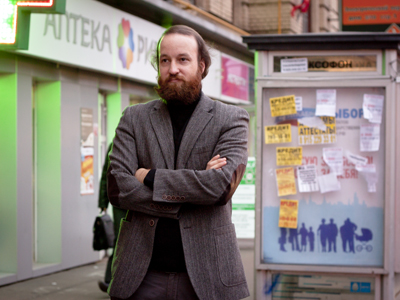This post is part of our special coverage Russia Elections 2011 [1].
Saturday’s rally in central Moscow drew to a close to the sounds of the iconic Soviet rock group Kino. The largest protests since the end of the Soviet Union criticized the outcome of Russia’s parliamentary elections on 4 December. And it wasn't just the music that brought back the spirit of upheaval from over two decades ago.
The mood was not set by police clampdowns and mass arrests—though these certainly occurred throughout the week following the elections. What many saw, instead, was the start of a wave of political engagement unprecedented under the rule of Vladimir Putin.
And, to some extent, the Russian state seemed to acquiesce. The City of Moscow had approved a rally of 30,000 people for Saturday—as many as twice that figure showed up [2].
Gregory Shvedov, the editor-in-chief of the online news agency Caucasian Knot [en [3]; ru [4]], is optimistic:
These parliamentary elections might become another keystone of change, of awakening of Russian citizens.
Caucasian Knot reports around the clock from the 20 regions within the Caucasus, a conflict-ridden region whose northern part lies within Russia's southern border.
For Shvedov and other independent journalists and activists—many of whom have taken to the internet as a tool to channel their message—optimism is key as the grass-roots opposition to United Russia, Putin’s ruling party, appears to be growing:
In the long run I am optimistic about being able to change people's perceptions in Russia.
We have about 1.7 to 1.8 million readings per month. We have been quoted about 600 times in national and international media in a few months’ time, and about 1,500 times by bloggers. This is much more than a year ago. The growth means that more people want to be informed, and more people want to share the information.
The staff of Caucasian Knot do not operate freely. Temporarily posted in a Moscow cafe, Shvedov excuses himself to sign a letter addressed to Russia's interior ministry. The ministry has requested the IP address of someone who has commented on one of Caucasian Knot’s articles. In writing, Shvedov and his colleagues deny the request:
The letter I just signed is one of the ways in which the federal authorities put pressure on us. They demand this kind of information all the time. And we always deny them.
DDoS attacks, another means by which the authorities have aimed to thwart an open online debate, are harder to deny. But despite attempts at online censorship, discussion has continued on sites such as Twitter, LiveJournal and Vkontakte.
Even on television, Russia's most popular and state-controlled source of information, word of the protests has made it through. To the surprise of many, Channel 1 and NTV, two state-owned, nationwide networks, ran evening-news reports on Saturday's demonstrations.
According to Shvedov, independent reporting will occasionally make it onto one of the nationwide networks, all of which are state-owned:
In late October, NTV broadcast a documentary on investigations into kidnappings in Chechnya in the North Caucasus. The film borrowed extensively from Caucasian Knot's own material. It was broadcast in the Far East and in the Urals before being taken off air.
That is a great example that even in state-controlled media, we can get through. In the USSR it was someone reading everything before publishing. This video could only be blocked after it had been broadcast. That is important.
In the North Caucasus, the media are less penetrable. According to Shvedov, censorship in the local press is so extensive that the federal authorities—who appear keen on monitoring the public mood [6] in the country—resort to independent media for information:
The president's representative in the North Caucasus, Alexander Khloponin, does not say how great Caucasian Knot is, because we ask questions he does not like. But he tells me and other independent journalists that he needs to know what is happening in the region.
The media in the North Caucasus, and in the south of Russia, are controlled by local authorities. It is a strange situation; they control [the media] because they are afraid that federal authorities will read something bad about themselves.
The authorities understand that if the state controls all media, they won't know how people actually live. If unaware, they will miss the moment when the protests start. And they certainly don't want a revolution, like in Libya, Syria and so on. That is why the internet is partly free.
The current resistance against the Putin regime may not amount to a revolution. The dominant aim of those who have taken to the streets—many of whom belong to the relatively privileged, urban middle class—has not been an overthrow of the Kremlin elite, but rather new and fair elections.
As the protests have made clear, such democratic reform will not come at the behest of foreign officials, but rather when Russia's population decides to take action—despite Putin's claims that Hillary Clinton, the US Secretary of State, ignited the protests [7].
Shvedov agrees that democratic action must come from within Russia itself:
Even though social apathy is spread throughout Russia, an active minority can change a lot. These so-called elections will not at all change how Russia is governed, but they can awaken a sleeping society.
This post is part of our special coverage Russia Elections 2011 [1].
